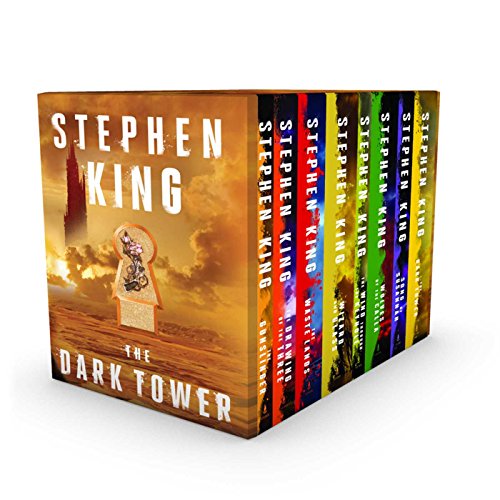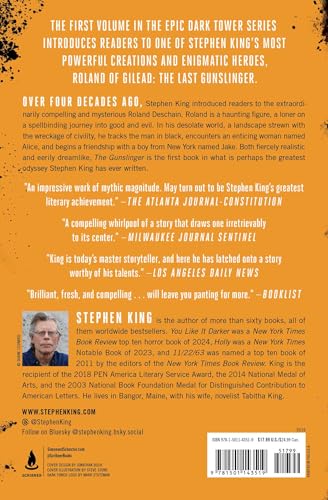Alright folks, buckle up. This is my review of Stephen King’s massive epic, The Dark Tower. I read it with a group of sleep-deprived friends and, let me tell you, it was a wild ride. There’s gunslingers, weird worlds, talking trains, and more existential dread than my last trip to IKEA. But is this doorstop of a novel actually worth the time—or is it just a fever dream dressed up in cowboy boots? Let’s get into it and find out, because trust me, this book has some serious highs, some strange lows, and enough twists to make your head spin like a possessed compass.
In a nutsheel
Stephen King’s The Dark Tower is a wild mix of fantasy, western, and a bit of horror. It’s like King stuck a cowboy and a wizard in a blender and just hit ‘on.’ The story follows Roland, a gunslinger on a long and lonely road, chasing after the mysterious Dark Tower (which, by the way, isn’t your average tourist spot).
Along the way, you’ll run into strange towns, oddball characters, and a world that always feels a bit off-kilter. Themes of obsession, fate, and friendship pop up all over the place. It’s the start of a big, weird journey that will test your attention span and maybe make you rethink long road trips forever. King fans and genre hoppers, you’ll probably love it. But don’t blame me if you develop a sudden fear of deserts.
Roland Deschain: The Relentless Gunslinger Chasing Shadows and Truth
Let me tell you, Roland Deschain might just be the most obsessed cowboy I’ve met on a page. This guy has one thing on his mind: The Dark Tower. Not some local pie-eating contest, not retirement, not even a nice cup of coffee—nope, it’s always about that damn Tower. I read this book thinking, ‘Man, if I had half of Roland’s drive, my lawn would mow itself.’
Roland is a gunslinger, but he’s not your rootin’, tootin’, shootin’ cowboy from your dad’s old westerns. No, sir. He’s got a tragic backstory, a cold stare, and enough emotional baggage to make the airport lose his luggage. His motivations run deep. The Tower calls to him, and he’s sure it’s the key to fixing, well, everything. World falling apart? Tower. Friends disappearing? Tower. My cat ignoring me? If you ask Roland, it’s probably the Tower.
He’s not a hero in the shiny sense—he makes some hard, even awful, choices. Sometimes reading about him feels like watching a friend eat something weird just to win a bet. You want to look away, but you can’t. I liked how human Roland felt. Sometimes he’s warm, sometimes he’s ice. He wants redemption, maybe love, but the Tower’s pull is always stronger. Watching him struggle is like watching someone try to quit potato chips. It’s tough, it’s messy, and you’re never quite sure if he’ll make it.
Next up, we’ll wander through the bananas world Stephen King built—where rules are made to be broken, and reality is about as stable as a Jenga tower at a toddler’s birthday party.
The Wild and Wobbly World of The Dark Tower
If you like your fantasy settings neat and tidy, The Dark Tower is here to stomp all over your expectations. Stephen King has built a world that feels like someone started with a spaghetti western, mixed in a heap of post-apocalypse, and then tossed the map out the window. One moment Roland and his pals are crossing a desert, and suddenly they’re next to a talking train that has more personality than some people at my high school reunion.
What makes the worldbuilding in The Dark Tower so good (and weird) is the way it keeps snuggling up to different genres. One page, you’re in a cowboy movie, the next you’re dodging deadly robots or listening to riddles from a train that’s a bit too clever for its own good. It’s not just that the world changes; it’s that the rules themselves get slippery. Time is all wonky. Space is bendy. If you ever tried to draw a map of this place, you’d probably end up with a doodle your dog could have done.
And of course, looming over all of it is the Dark Tower itself. The Tower sits slap-bang in the middle of everything, the center point of all worlds, like a moody skyscraper that refuses to explain itself no matter how nicely you ask. The Tower is the glue and the mystery, the thing that makes this world both exciting and deeply strange. Next up, let’s wrangle the writing style and pace to see if King keeps our boots moving briskly or if he leaves us stuck in the sand!
Stephen King’s Writing Style and the Relentless Pace of The Dark Tower
Let’s talk about Stephen King’s writing style in The Dark Tower. If I had a dollar for every time someone told me they couldn’t start this series because it ‘seemed weird,’ I’d have enough for a steak dinner—and a side of fries. King’s writing here is wild and layered, like an onion that sometimes makes you cry, but also sometimes tastes like bourbon.
King juggles a lot, and I mean a lot. The Dark Tower itself is this moody, looming presence throughout the book—always there, sometimes in the background, sometimes full in your face, like when your mother-in-law visits. King’s words move from poetic to plain, from scary to funny. I laughed, I shivered, I sometimes scratched my head. His sentences are punchy and direct, but every now and then he throws in a line that makes you stop and think, “Wait, what did he just say about a talking train?”
The pace? Oh, buckle up. Sometimes it sprints, dragging you along like a runaway shopping cart. Other times, it stops for deep conversations and long walks in creepy wastelands. It’s never, ever boring though. You can tell King is having fun, and he wants you along for the ride—even if you get a little carsick. My friend Dave—who reads even slower than he walks—said the chapters kept him up past midnight, and that’s saying something. You won’t want to put it down, even if you sometimes want to yell at Roland for not using Google Maps.
Next up, let’s untangle the epic spaghetti bowl that is fate and obsession in this story. Bring your fork!
Themes of Fate and Obsession in The Dark Tower
I don’t want to alarm anyone, but if fate was an event, Roland would be the guy who shows up early, brings his own snacks, and refuses to leave. Seriously, the whole book is soaked in fate. It’s like King shook fate all over his manuscript like too much salt. Roland hears the call of the Dark Tower and, buddy, he can’t ignore it—even if his shoes are on fire (metaphorically, thankfully).
The Dark Tower isn’t just a building. It’s the weird, cosmic McGuffin that drives everything. Roland is so obsessed with reaching it, it’s almost unhealthy. I know what it’s like to fixate on something—last summer I spent three weeks hunting for my favorite lost sock—but Roland’s journey makes me look like an amateur. His obsession is tragic and heroic all at once. He ditches friends, misses chances at happiness, and keeps charging forward, always with the Tower at the center of his compass. It’s both inspiring and a little sad—kind of like watching someone eat only beans for a year because they promised themselves.
King uses fate like a ruthless puppeteer. There are moments I could almost hear the author laughing as he throws Roland new curveballs. But, it’s not just doom and gloom—fate also brings hope. Sometimes, destiny gives Roland a win, even if it’s just a small one, like a halfway decent cup of coffee.
Would I recommend The Dark Tower? Yep! If you like big, weird themes and don’t mind a hero who’s stubborn as a goat, get reading. Just don’t say I didn’t warn you about the obsession.
Conclusion
Well folks, that wraps up my review of The Dark Tower. Reading this book was a wild ride for me and my friends—like trying to play chess with one glove on. We met a stubborn cowboy (Roland), wandered through a spooky dream-world, and got lost in all of Stephen King’s genre-mashing. The book’s got guts: sweeping ideas, a big heart, and lots of strangeness. It staggers here and there, with some slow bits and confusing turns, but if you like your stories with fate, obsession, and lots of bullets, you’ll have a blast. If you’re not fond of heavy books or weird worlds, maybe sit this one out. For me, I had a great time, even if my brain had to take a nap afterward. Thanks for reading—now go on, pick up something weird!



